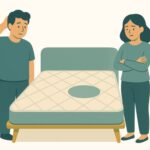Fall is here and many of us will be returning to our reqularly scheduled routines all while putting a busy and hopefully happy summer behind us. Every season our sleep habits shift. Changes in temperature and light transistioning slowly impacts how much and how well you sleep. Prioritizing good quality sleep is worth it for you health and well-being. It’s important to be aware of seasonal transitions and how to navigater them.
Adjusting to a new sleep season
A change in your bedtime and modifying your sleep habits to coincide with seasonal changes are good insurance to getting a better night’s sleep throughout the year. Just a few hours shift in time are enough to throw a wrench in your sleep-wake cycle, hence the dreaded jet lag people experience when traveling.
Investing in bedding that will help regulate your temperature during sleep is important. You want to make sure you’re not too hot or too cold. When choosing blankets, sheets, pillowcases and duvets, make sure they are breathable and comfortable materials. Materials like cotton or linen are conducive to sleep. Also, when a bedroom temperature is too cold, it will cause discomfort and affect the quality of your sleep. According to sleep experts, the ideal bedroom temperature is 65 F (18C), but depending on your individual preferences, it may vary a degree or two.
Great sleep during any season
Whether it’s cold, crisp and snowy or hot and humid there are a few rules of thumb for better quality sleep. Most of these guidelines revolve around your bedtime and sleep habits, also known as sleep hygiene.
8 must-dos for all seasons:
- Aim for 7-9 hours of sleep each night.
- Set a consistent bedtime and rise time.
- Use your bed for sleep. Avoid other activities like watching television, surfing the net and eating in bed.
- Practice a regular wind-down routine to help your mind and body prepare for sleep.
- Sleep in a bedroom that’s cool, dark and free of noise.
- Limit caffeine after 1 pm since it will linger in your system and may disrupt your rest.
- Avoid heavy meals around bedtime and keep late-night snacks light.
- And finally, see your healthcare provider if you are concerned about having a sleep disorder.
Wake up and get ready to go!
Better nights sleep gives rise to better mornings, bringing your goals into focus and dreams within reach.



